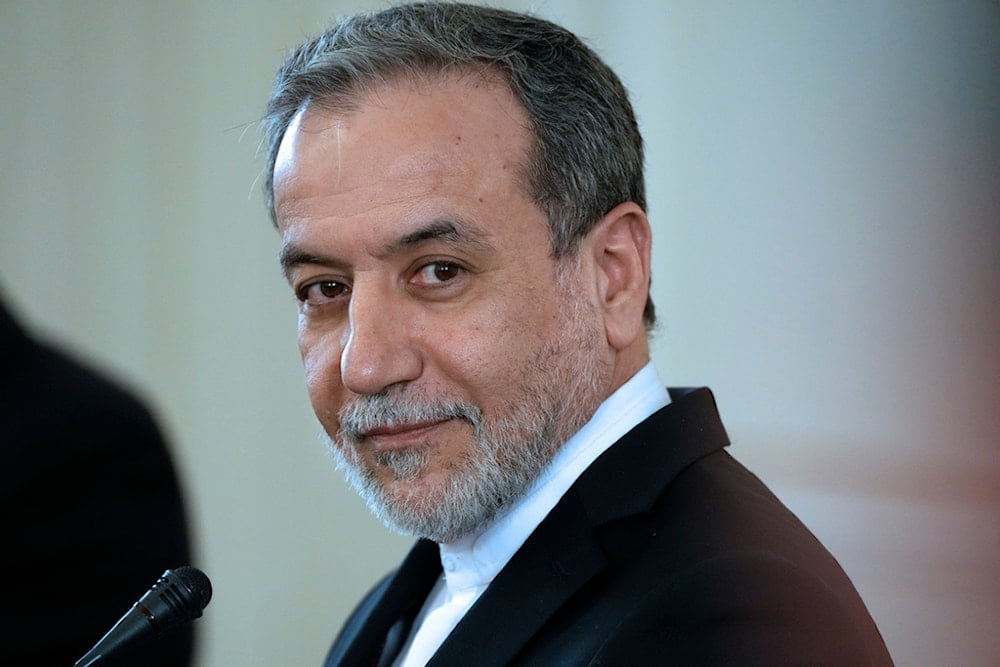Iran ready to consider troops in Syria amid terrorism resurgence
Iran’s Foreign Minister Abbas Araghchi signals Iran's readiness to deploy troops to Syria upon request, criticizing Turkiye for failing commitments under the Astana process.
-

Iranian Foreign Minister Abbas Araghchi attends a joint press briefing with his Syrian counterpart Bassam Sabbagh, in Tehran, Iran, Tuesday, November 19, 2024. (AP)
Iran has expressed willingness to consider deploying troops to Syria if an official request is made by the Syrian government, Iran's Foreign Minister Abbas Araghchi said. He highlighted that the resurgence of terrorism in northwestern Syria, marked by surprise attacks from terrorist groups, poses greater security risks to "neighboring countries such as Turkiye and Iraq than to Iran."
In an interview with The New Arab, Araghchi voiced concern over the potential breakdown of the Astana process, a diplomatic framework established in 2017 with Russia, Turkiye, and Iran as guarantors. Designed to facilitate dialogue and resolve the Syrian conflict, the process is now under scrutiny as terrorist violence escalates. Araghchi criticized Turkiye, a key backer of foreign-supported militancy in Syria, for failing to meet its commitments under the initiative.
Discussing Tehran’s ties with its allies in the Axis of Resistance, Araghchi clarified, "Iran does not command Resistance factions in Arab countries and does not have organizational ties with them; rather, it supports their cause and provides assistance when necessary."
On Gaza, he stated, "If Israel enters negotiations with Hamas for a ceasefire and the release of captives, it would signify Israel's defeat."
Araghchi also touched on improving ties with Saudi Arabia, noting their distinct nature from relations with Washington.
On nuclear discussions with Europe, he expressed "many reasons for pessimism," while ruling out dialogue with the US under current circumstances.
"We are waiting to see how the new administration will shape its policies; then we will formulate our own policy," he said.
Syria's neighbors must prevent terrorist advancement: IRGC chief
The Iranian Armed Forces' Chief of Staff, General Mohammad Bagheri, held separate phone calls with his Russian, Iraqi, and Syrian counterparts earlier today.
During these discussions, Bagheri emphasized that the attacks by terrorist groups in Syria pose a serious threat to the region.
He further stated that the timing of the attack, coinciding with the fragile ceasefire in Lebanon, suggests an US-Israeli conspiracy aimed at weakening the Axis of Resistance.
The Iranian Chief of Staff urged Syria's neighboring countries to "take the necessary measures to prevent the terrorists' advance."
Similarly, an advisor to Iran's Leader Sayyed Ali Khamenei, Ali Akbar Velayati, confirmed on Tuesday that "the events in Syria are part of an exposed plan, a scheme designed to distort truth and propagate falsehood."
In a press statement, Velayati emphasized that "the United States, the Zionist entity, and all regional countries, whether Arab or non-Arab, must realize that Iran will steadfastly support the Syrian state until the end."
He also warned US President-elect Donald Trump, saying that "global conditions are now far more challenging than during his previous presidency," and that independent nations "will not succumb to his threats or intimidation."
Addressing the Resistance's victory in Lebanon over the Israeli occupation, Velayati highlighted that the Resistance "has provided Palestinians with unprecedented and unparalleled support in the history of Islamic unity."
Read more: Akbari: Diplomatic efforts continue, Syria paying anti-'Israel' stance

 3 Min Read
3 Min Read










